Abstract
The article presents current research on STEAM in the international educational space, the European Commission’s policies in the field of education through the Erasmus+ program, the recommendations of the Curriculum for Early Education and gives a brief overview of the activities implemented, the products obtained, the results of the cooperation project, Key Action 2 (KA2): "Act Green". The cooperation project “Act Green” was implemented in the kindergarten of Vocational School “Tiberiu Morariu” Salva, Bistrita-Nasaud, Romania for 36 months, in collaboration with five educational institutions from Finland, Portugal, Greece, and Italy. We will present the methods of our research, we will review the results obtained within the project and the development of STEAM skills in preschoolers, and we will describe the collaborative activities in which European preschoolers were involved. We will approach this concept through current research on STEAM in preschool, through the specific Romanian preschool education and the European Commission’s European program of education and training, Erasmus+.
Keywords: Erasmus+, educational projects, kindergarten, preschool, steam skills
Introduction
The development of STEAM skills in preschoolers is an area of interest from the perspective of all actors involved in the educational process because these skills are the foundation for the formation of concepts and for addressing scientific contexts. STEAM (Science, Technology, Engineering, Arts, and Mathematics) is a new concept, created by changing the paradigm of STEM education, by introducing it alongside STEM disciplines (Science, Technology, Engineering, and Mathematics) of the Arts. The game is the basis of the activities in the educational environment of the kindergarten, but due to curiosity and creativity, preschoolers manifest a spontaneous interest in this area of development and exploration, STEAM.
The objective of this article is to describe the potential of the Erasmus+ Cooperation project “Act Green” in developing STEAM skills in preschool-aged by presenting the collaborative activities implemented, analyzing the products achieved, and presenting these results. The cooperation project “Act Green” was implemented in the kindergarten of Vocational School “Tiberiu Morariu” Salva, Bistrita-Nasaud, Romania for 36 months, in collaboration with five educational institutions from Finland, Portugal, Greece, and Italy. The cooperation project “Act Green” was awarded the second prize at the national eTwinning project competition in 2020 in the category: “Environmental and climate protection. The Climate changes”, also was selected as good practice at the European Erasmus+ projects, Conference “Green Europe”, which took place on 4-6 May 2022 in Berlin, Germany.
Problem Statement
(Bocoș, 2016a) define the ability as: “acquired ability of the individual to perform an activity that involves skill, understanding, dexterity, precision, finesse and it’s formed by practice and developed by the complex action of several factors, of which intelligence has a primary role” (p. 16).
(Baciu et al., 2022) define the concept of STEAM as follows:
Science, Technology, Engineering, Arts and Mathematics (abbreviated STEAM) - Teaching model that started from the STEM model, in which integrated Arts and Design. The aims of this didactic model follow developing logical, scientific, divergent, critical, and artistic thinking, in the context of solving complex problems and applying solutions in real life. (p. 178)
(Baciu et al., 2022) define the concept of STEM as follows:
Science, Technology, Engineering and Mathematics (STEM) - regarding the component disciplines, most educational institutions consider that STEM includes the following major fields of study: natural, physical and life sciences, including medicine; computers, electronics, and other technology, related disciplines; all types of engineering; mathematics or any field involving the application of mathematical principles. The major goals of STEM education refer to: the development of problem-solving thinking and the application of solutions in real life; understanding the concepts and training of operational procedural skills, necessary in the process of solving problems; formation of logical-mathematical, productive, divergent and critical thinking; developing the capacity and the spirit of collaboration to identify solutions to the problems addressed. This didactic model also promotes the study of these disciplines from an early age, in order to stimulate children's curiosity, improvisation, as well as their familiarity with exploring the real world, as a foundation for forming concepts and approaching scientific contexts. (pp. 178-179)
(Baciu et al., 2022) defines the concept of STEAM as follows:
Science, Technology, Reading, Engineering, Arts and Mathematics (abbreviated STREAM) - Teaching model that started from the STEAM model, in which integrated reading and writing, which are essential skills for effective interpersonal communication. Thus, the aims of this didactic model started in addition to the development of logical, scientific, divergent, critical, and artistic thinking, in the context of solving complex problems and applying solutions in real life, to develop the communication skills of learners. The promoters of STREAM consider literacy in reading, arithmetic literacy, and digital literacy, to be essential in the harmonious development of the person. (p. 179)
Michelle (2020) argues that STEAM promotes the focus on the development of children’s socio-emotional skills from an early age, social and emotional intelligence, creativity, collaboration and critical thinking, which in turn are combined with technical skills. Because we don’t know what the jobs of the future will look like or what selection criteria will apply to candidates as we progress in the 21st century, it makes sense to train children with diverse skills, developing their ability to think creatively and find creative solutions, STEAM education can do.
All the definitions presented above capture the specifics of the STEM / STEAM approach in the didactic act, emphasizing one characteristic of this approach. In our opinion, the STEAM concept refers to the totality of actions initiated by the teacher in order to organize, structure, and carry out learning activities aimed at developing in pre-schoolers desirable skills in Science, Technology, Engineering, Arts, and Mathematics.
(Bocoș, 2016a) define preschool as:
A child aged 3-6 years, attending kindergarten, not yet having reached the age required to enter in school (by reference to the legislation and to the structure of the education system in Romania). The preschool has specific characteristics of physical, intellectual and psycho-social development, which are made up of landmarks of the teaching activity in kindergartens for children” (p. 137)
(Bocoș, 2016b) define the program as:
(In a broad sense, with reference to the organization of educational activities at different levels) a systemic succession of educational activities, which are carried out in a predetermined order, with a view to achieving educational ends, often on the basis of a plan, valued as a projective anticipatory mental tool or as a written document. (p. 178)
(Răduț-Taciu et al., 2015) define the Erasmus+ program as: "the most important vocational, education and training program in the European Union, in terms of mobility and cooperation" (p. 308). The aim of this program is to support the efforts of the partner countries of the European Union, the countries associated with this program, to make effective use of Europe's human talent and social capital for lifelong learning, coupled with support for formal, non-formal and informal learning in the fields of education, vocational training, and youth.
One of the priorities of the Erasmus+ program is the development of STEAM skills in education, this priority is defined as: "promoting the participation of children in the fields of STEAM study and in particular in engineering, ICT and advanced digital skills; developing guidance and mentoring programs for children, especially girls and women, to pursue fields of study and occupations in STEAM and ICT; promoting gender-sensitive education and training practices in STEAM education; eliminating gender stereotypes in STEAM." The Erasmus+ program implements three key actions: Key Action 1 (KA1) - mobility for people, Key Action 2 (KA2) - Cooperation between organizations and institutions, and Key Action 3 (KA3) – Educational policies development and cooperation support.
(Bocoș, 2016c) define the project as:
Temporary concern for creating a product or offering a unique service, which involves carrying out a system of activities, planned, organized, articulated in such a way as to achieve certain objectives, within a well-defined period of time, with the use of the allocated resources. (p. 197)
The curriculum for early education (Ministerul Educației Naționale, 2019) defines as educational projects and programs (local, county, national, international), to which the educational unit or the teaching staff has joined, contain sets of actions planned for a fixed duration of time, leading in the long term to the formation of key competences. Since these must be done in a logical sequence, their planning will take into account the correlation with other activities carried out with children and the avoidance of overloading. It is recommended that each teacher carry out activities in at least one national or county educational program/project, specific to the preschool level, depending on the identified opportunities.
Kindergartens and schools in Romania where kindergarten groups are integrated implement Erasmus+ projects under Key Action 2 (KA2), called cooperation projects whose purpose is to develop European education through collaborative products and transfer of good practices. The Erasmus+ Program Guide (2018) describes the Erasmus+ cooperation projects as facilities for: "developing skills and competencies in forward-looking areas such as climate action, clean energy, artificial energy, artificial intelligence, robotics, green engineering, data analysis, etc. is essential for the sustainable growth and cohesion of the future European Union." The cooperation projects under the Key Action 2 (KA2) of the Erasmus+ program make a significant contribution to the development of STEAM skills in preschool through activities based on: critical thinking, teamwork, problem-solving, innovation, creativity, communication, and multiculturalism.
Knowing the current meanings of the concepts of education STEAM in preschool children represents, in practice, the premise for modern design and effective teaching activities, and provides added value to the activities carried out by the teacher. The definitions formulated by the specialists, through the accents they emphasize, support the teacher in order to select the most suitable activities for developing STEAM skills, depending on the particularities of the preschool children, the predominant type of intelligence, and the learning style. In our opinion, the activities carried out within the European cooperation projects are collaborative learning activities aimed at developing in preschool children desirable skills in Science, Technology, Engineering, Arts, and Mathematics.
Research Questions
In this article, the following questions were explored:
-What teaching methods were effective to develop STEAM skills in preschool children?
-What STEAM skills have been developed due to the implementation of the Erasmus+ cooperation project ”Act Green" at the preschool children from the Vocational School "Tiberiu Morariu” Salva, Romania and from the European partner schools?
-Which activities were most enjoyable for preschool children?
Research Methods
The research methods used in the framework of the cooperation project, Erasmus+ “Act Green" with no.: 2018-1-FI01-KA229-047262, carried out over a period of 36 months were the observation, the analysis of the products of the activities carried out by the preschool children and a survey based on the questionnaire applied to the participating preschool teachers. The project involved 115 preschoolers aged between 5-6 years from partner kindergartens: Huutijarven Koule, Kangasala, Finland, Vihola Kouulu, Nokia, Finland, Istituto Compresivo Gambettola, Italy, Agrupamento de Escolas de Vialonga, Portugal, Dimotiko Scholeio Plateos Imathias, Greece, Vocational School ”Tiberiu Morariu” Salva, Romania guided by 10 teachers. During the application of research methods, data collection, and interpretation, we observed changes in the work of transnational teams, and improvement of language and digital skills. .
Findings
The cooperation project was carried out in partnership with kindergartens taking into account the European priority of the Erasmus+ program on the development of STEAM skills in preschool and the annual theme “Green Europe” on green skills. The life cycle of the project began in 1.09.2018 and ended on 31.08.2021. The pandemic period due to the SarsCov-2 virus posed a challenge for preschool children and guided teachers, leading to increased digital collaboration in the space of Twinspace and e-learning.
The activities within the project were organized under the theme “STEAM with GREEN”, developing STEAM skills through green activities, which appears in the eTwinning space of the project. The activities included content from the six curriculum integration themes of the Curriculum for Early Education (2019): “Who am I/are we?, When, how, and why is it happening?, How is it, has it been and will it be here on earth?, Who and how does it plan/organize an activity?, How do we express what we feel?, What and how do I want to be?”
The activities involved teamwork and critical thinking among European preschool children, visible in the products obtained in the project. The common calendar of the project was an important product in which each group of preschool children involved drew the theme of the months and with the help of the teachers were noted short action messages in the native and English languages regarding the protection of the environment. An online vote was opened with the help of the application, www.poll.com where pre-schoolers selected and voted, two creations of the partner groups that were chosen and edited in the final form of the project calendar.
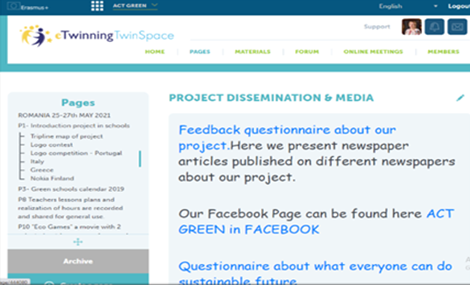
One of the enjoyable activities for the children was focused on problem-solving and led to the development of another product of the project, the map with the endangered animals, completed in a digital format with the help of the application: www.thinklink.com. Joint activities were carried out following the Erasmus+ project Gant, in which groups of pre-schoolers prepared drawings with animals, maps which they then pasted drawings and presented during virtual conferences with European partners. The pre-schoolers presented short descriptive poems in their native languages about endangered animals, then the poems were translated into English and posted in the virtual space of the common map. The use of an interactive system and a smart board has helped increase the digital skills of preschool children by adding scanned files to the map’s dyed dots and completing this application. Preschool children, teachers, and their parents accessing the project’s virtual space, Twinspace (n.d.) learned about the arctic biodiversity in Finland, the marine biodiversity in Italy, the island biodiversity in Greece, the mountain biodiversity in Romania, and the ocean biodiversity in Portugal.
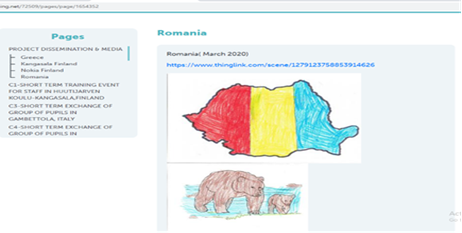
Within the mobility of Huutijarven Koule School, Kangasala, Finland, participating preschool teachers were familiar with a new method of learning: “Action in Education”. This method supports outdoor learning in different natural or anthropogenic spaces throughout the program of a kindergarten day with different learning tasks for preschool children. The theme given by the Finnish coordinating team, the mixed team of preschool children and teachers in Romania was the identification of migratory birds in the spring season. Preschool children showed creativity by identifying migratory bird species in our village area by photographing them at feeding sites, by recording their song, by drawing them, their nests, their offspring, by using ornithological albums, digital archives, arts activities, filming the game “Little bird, move your nest”. The activity was completed by creating an educational film, an innovation for the preschool level comprising aspects of the activities carried out, using digital applications such as Google Drive, Windows Movie maker, YouTube which was subtitled by teachers in English and sent to the partners in the project.
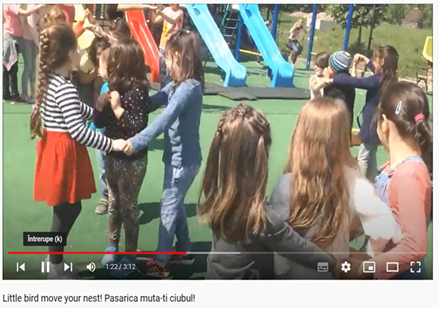
The activity built around European event “European day of languages – 22 September” was thought on the skills of European inter-culturalism and diversity. Preschool children recorded voice messages in their native languages and English on environmental theme and following a random distribution using the random.com app, sent the messages to European preschool children to mark this event. A related task was the creation of word-clouds by cutting and pasting environmental messages for European preschool children, consolidating language elements, practical skills, also in virtual format by using the www.worldcloud.com app.
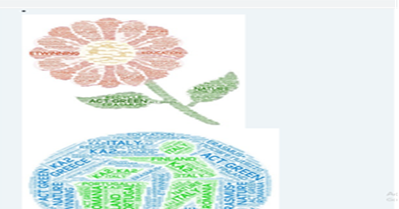
The final product of the project is a collaborative book “Green Footprints”, an e-book created with the help of the Book-Creator application. Preschool teachers from partner countries selected scientific materials about natural parks and protected areas in their own country and preschool children drew different landscapes, fauna and flora elements, geological elements or protected areas making the illustrative part of the book. Preschool children have developed their creativity and ability to communicate with the teachers in the group. The participating preschool teachers improved their methods of teaching STEAM content, and improved their language skills, IT skills, and citizenship skills.
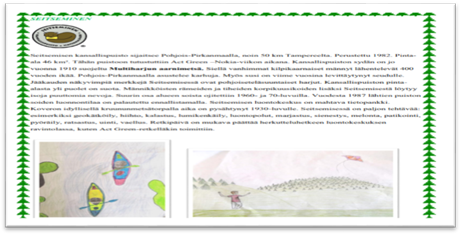
At the end of the project, the 10 preschool teachers from European kindergartens answered at three questions in a survey based on a questionnaire, initiated by the Romanian team, by selecting the methods that have been used most often in the group work during the implementation of the cooperation project, Erasmus+ “Act Green ". The most common methods used in the group were the project based learning method, the e-learning method, the cooperative learning method, the out-door education method.
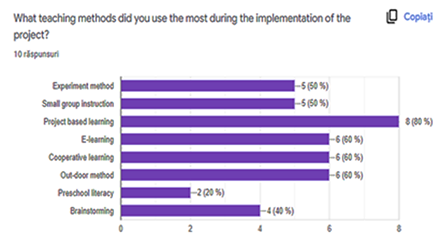
Teachers participating in the cooperation project, Erasmus+ “Act Green” following the observation of the activity of preschool children, the analysis of physical and virtual portfolios, the oral questioning of preschool children, discussions with the parents of the preschool children, identified STEAM all developed following the implementation of the project. The first places in this survey are creativity, critical thinking, problem-solving, communication, intercultural skills, and teamwork, developed during the project implementation.
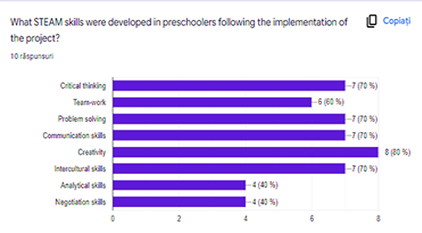
The teachers participating in the cooperation project, Erasmus+ "Act Green” asked the preschool children orally about the activities carried out, voting at the group level the one they liked the most. Leading positions in this survey are the book with illustrations “Green footprints”, activities taught by foreign teachers in mixed teams during international mobility, the calendar of the school, kindergarten vegetable gardens, the activity “Action in Education”.
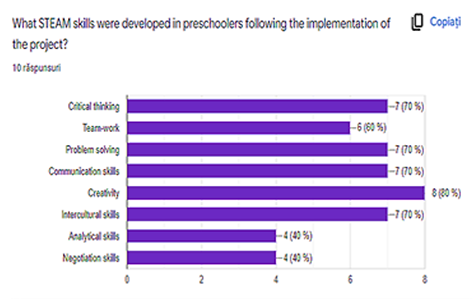
An important part of the project was the assessment activity carried out by preschool children for the products and activities of European colleagues from the kindergartens involved in the project, but also the self-assessment of their own activity, own products made verbally or using digital applications.
We have taken care throughout the project implementation to comply with the GDPR rules, obtain the consent of parents and guardians, and comply with the laws in force regarding digital materials uploaded to the platforms used and on social networks.
(https://twinspace.etwinning.net/72509/home; https://erasmusactgreen.blogspot.com/;
https://www.facebook.com/groups/290262635118491/)
Conclusions
The implementation of the Erasmus+ cooperation project “Act Green” has had a considerable impact on preschool children in our institution because they were exposed to various learning activities, using strategies learning by discovery, the project method, and the questioning contribute greatly to the increase of STEAM skills. During the implementation of the project, preschool children had the chance to make observations issue hypotheses, think critically, operate with basic concepts from STEAM, to ask questions, to work as a team. The didactic strategies used were meant to actively involve preschool children in collaboration with European educational institutions, in creating content, forming new friendships, using digital applications, and an awareness of their own efforts to protect the environment. The development of STEAM skills is important for the child’s career from kindergarten to higher education because STEAM is a topic of interest to the Educational Community and Business Community.
The project was awarded with eTwinning national quality certificates in four partner countries (Finland, Portugal, Greece, and Romania), with eTwinning European quality certificates, and won second place at the eTwinning National Project Competition (ISE Bucharest) at Environmental Protection and Climate. Climate change Section (2020).
Congratulations to the preschool children, the teachers of the Vocational School “Tiberiu Morariu”, Romania for the success of this project and we thank the European preschool children and teachers, partners in the project for this extraordinary educational collaboration!
References
Baciu, C. (Ed.), Bocoş, M.-D., & Magdaş, I.-C. (2022). Tehnologia Informaţiei şi a Comunicării în Educaţie (TICE). Dicţionar de termeni [Information and Communication Technology in Education .Dictionary of terms], (Volume I, A-K). CEEOL Press.
Bocoș, Răduț T. (2016a). Dicționar Praxiologic de pedagogie [Praxiological dictionary of pedagogy], (Volume I, A-D, p. 16). Paralela 45.
Bocoș, Răduț T. (2016b). Dicționar Praxiologic de pedagogie [Praxiological dictionary of pedagogy], (Volume II, E-H, p. 137). Paralela 45.
Bocoș, Răduț T. (2016c). Dicționar Praxiologic de pedagogie [Praxiological dictionary of pedagogy]. (Volume V, P-Z, pp. 178-197). Paralela 45.
Michelle, I. (2020). STEM, STEAM and professional and technical education. Didactica Pro Magazine (No.1 (119) / 1810-6455).
Ministerul Educației Naționale [Ministry of Education]. (2019). Curriculum pentru educație timpurie [Curriculum for early childhood education]. Anexă la OMEN nr. 4694/ 02.08.2019 privind aprobarea Curriculumului pentru educația timpurie, text publicat în Monitorul Oficial al României, nr. 686 bis/ 20.08.2019 [Annex to OMEN no. 4694/ 02.08.2019 regarding the approval of the Curriculum for early education, text published in the Official Gazette of Romania, no. 686 bis/ 20.08.2019].
Răduț-Taciu, R., Bocoș, M.-D., & Chiș, O. (2015). Tratat de management educațional pentru învățământul primar și preșcolar [Treatise on educational management for primary and preschool education]. Paralela 45.
Twinspace (n.d). Twinspace of “Act Green” Erasmus+ project. Retrived on 03 March, 2022 from https://twinspace.etwinning.net/72509/home
Copyright information

This work is licensed under a Creative Commons Attribution-NonCommercial-NoDerivatives 4.0 International License.
About this article
Publication Date
10 April 2023
Article Doi
eBook ISBN
978-1-80296-961-0
Publisher
European Publisher
Volume
5
Print ISBN (optional)
-
Edition Number
1st Edition
Pages
1-1463
Subjects
Education sciences, teacher education, curriculum development, educational policies and management
Cite this article as:
Găzdac, V., & Bocoș, M. (2023). Developing Steam Skills in Preschoolers. Presentation of Project Erasmus+” Act Green”. In E. Soare, & C. Langa (Eds.), Education Facing Contemporary World Issues - EDU WORLD 2022, vol 5. European Proceedings of Educational Sciences (pp. 775-785). European Publisher. https://doi.org/10.15405/epes.23045.77

